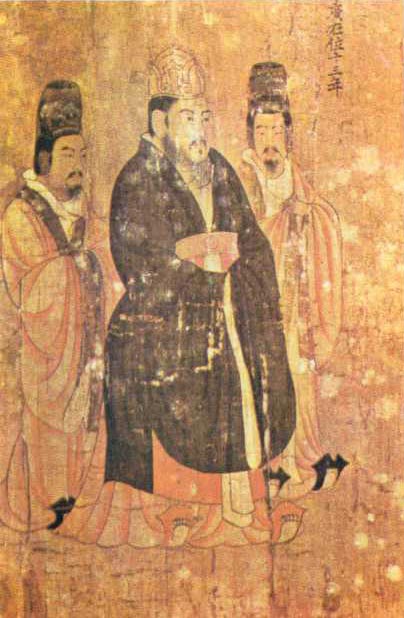 Emperor Yang, also known as Yang Guang, was the second emperor of the Sui Dynasty. His original name was Yang Ying but his father decided to change it to Yang Guang after consulting with oracles.
Emperor Yang, also known as Yang Guang, was the second emperor of the Sui Dynasty. His original name was Yang Ying but his father decided to change it to Yang Guang after consulting with oracles.
The Sui Dynasty was established during the year 581 CE and it lasted until the year 618 CE. Emperor Wen of Sui, the father of Yang Guang, established the dynasty after the death of China’s previous Emperor. The Sui Dynasty would oversee a major unification of China. Emperor Yang inherited the royal throne following his father’s death. Although there is no direct evidence, many historians believe that it was actually Yang Guang who ordered the murder of his father. By tradition, it is Yang Xiu, the older brother and first child, who shall inherit the throne. However, Yang Guang made accusations against his older brother which caused Emperor Wen to lose trust in his first child. This is how Yang Guang, his second son, became heir to the throne. Yang Guang also had a lot of military achievements which may have also helped him to convince his father to make him the heir to the dynasty.
Emperor Yang Guang served as the leader of the Sui Dynasty from 606 to 618 CE. During this time, he engaged in a great number of projects. He was able to successfully expand the empire, however, Emperor Yang used different methods than his father. While his father sought support from the nomadic tribes, Emperor Yang preferred to strengthen his people through education. He restored the Confucian method of education. While channeling its attention towards educational reform, the Sui Dynasty lost support from the nomads.
Emperor Yang also focused on construction projects, including expensive projects like the Grand Canal of China which is also known as the Beijing Hang Zhou Canal. Measuring 1,766 km, it is now known as the longest canal, or manmade river, in the world. The canal starts from the current capital of China, Beijing, and goes all the way to other provinces such as Tian Jin, He Bei, Shan Dong, Jiang Su, Zhe Jiang, and lastly, Hang Zhou.
He also ordered the reconstruction of the famed Great Wall of China which was originally built in the Qin Dynasty. The reconstruction not only cost a fortune, but also resulted in the death of nearly six million people. He also sent out expeditions to expand the reach of his empire. These expeditions eventually brought them to Vietnam. Unfortunately, malaria was widespread in the area during that time which caused thousands of Sui soldiers to die.
During this period, Korea had three kingdoms. One of which was the kingdom of Goguryeo. Emperor Yang ordered three expeditions to Goguryeo in an effort to conquer it. Each of these expeditions needed at least one million men and all of them ended in failure. This caused the empire to suffer from a major financial crisis. The people started to revolt against Emperor Yang Guang at this time.
Emeperor Yang Guang’s rule was ended by a revolution. The emperor spent his last days in the Jiang Du province before the revolutionaries caught up with him. He was killed by Yuen Huwaji, the general of the Sui military. The coup not only killed Yang Guang, but also his entire family, including his brother, children, and grandchildren. The only person left in his family was Yang Hao, who eventually inherited the throne. Despite being able to achieve many accomplishments during his rule, a lot of historians regard Emperor Yang Guang as one of the worst tyrants in the history of China. He is blamed for the short lived Sui Dynasty. This dynasty was then followed by the Tang Dynasty.